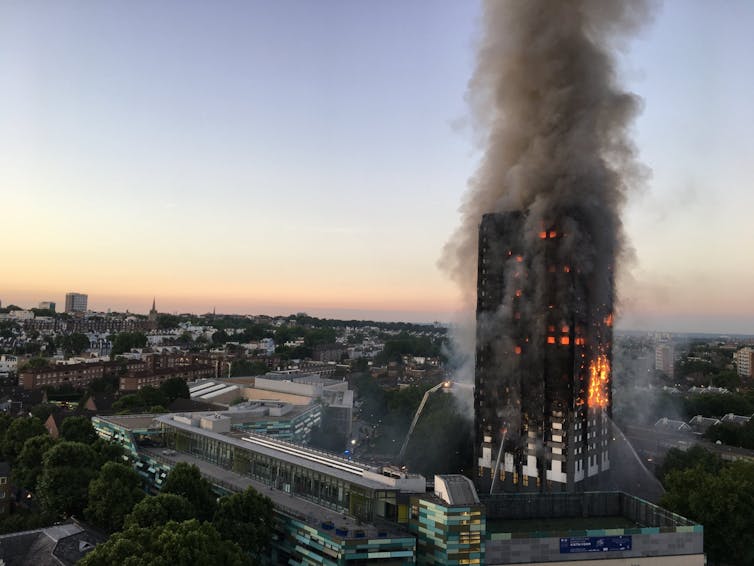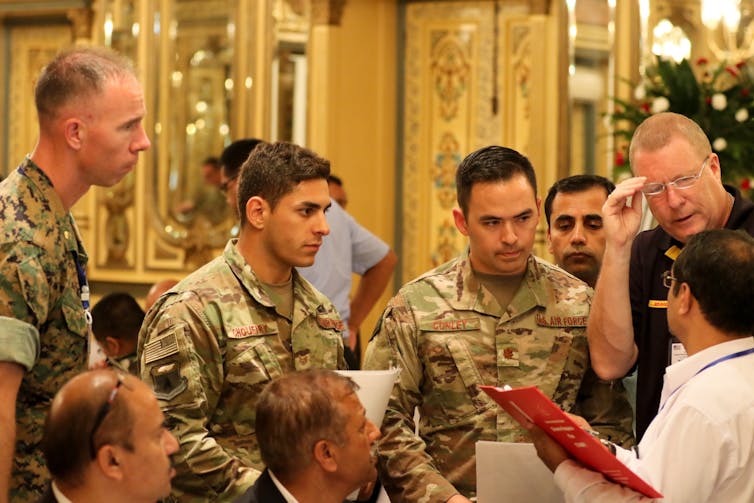Making life-or-death decisions is very hard – here's how we've taught people to do it better
- Written by Laurence Alison, Director of the Centre for Critical and Major Incident Psychology, University of Liverpool
When faced with a rapidly advancing fire threatening a community, it can be hard to know how best to save lives.
Is a rapid evacuation better, or is it safer for residents to stay where they are? The whole situation can change in an instant, and delays and indecision can be fatal.
As wildfires spread across California[1], a report about a massive fire in London in 2017 can offer useful lessons for emergency managers and residents.
Inside the Grenfell Tower fire
On June 14, 2017, a refrigerator in a London apartment had an electrical malfunction[2] that started a fire. For the first two hours after the fire was reported, officials told the apartment building’s residents not to evacuate[3]. Rather, they recommended people stay in their apartments and trust the building’s design to contain the fire to the unit where it started.
The city’s fire officials were faced with two types of potential tragedy: people dying in their apartments or getting injured or killed trying to evacuate.
In hindsight, they took too long[4] to realize the fire was out of control, and to change their instructions, telling people to get out. Less than four hours after it started, the fire had engulfed the 24-story Grenfell Tower, home to just under 300 people, of whom 72 died[5].
A similar problem has arisen in California wildfires[6] – including in 2018, when delays in the order to evacuate the town of Paradise, California[7], led to the deaths of 56 people.
 A rapidly growing fire at the Grenfell Tower in London challenged city officials’ decision-making skills.
Natalie Oxford/Wikimedia Commons, CC BY[8][9]
A rapidly growing fire at the Grenfell Tower in London challenged city officials’ decision-making skills.
Natalie Oxford/Wikimedia Commons, CC BY[8][9]
Choosing the ‘least worst’ option
As scholars[10] who[11] study human decision-making in potentially fatal circumstances, we’ve learned that many people, even trained military personnel and emergency responders, find it hard to make decisions in extreme situations, such as large fires.
The resulting delay, which we’ve called “redundant deliberation[12],” happens when people take too long to make a choice between difficult options.
We’ve found indecision is the most dangerous aspect[13] of a high-stakes situation. We have also proposed theories about the origins of this delay, and how it can be overcome, in our recent book, “Conflict: How Soldiers Make Impossible Decisions[14].”
Our research[15] has found that redundant deliberation is more likely to occur when there is no standard policy to guide decision-makers, or, as in the Grenfell fire, when the normal practice doesn’t fit the actual circumstances.
Many apartment buildings’ fire plans involve telling residents to stay put, because fireproof walls, floors and ceilings are designed to contain flames to the apartment where they started.
That was the plan[16] at the Grenfell Tower. London fire officials stuck to that advice even as the fire spread into dozens of neighboring apartments[17].
Their error was in relying too much on fixed rules and written policies, rather than understanding how best to protect human life in a rapidly changing fire that defied the expectations those policies relied on. The London fire chiefs’ years of accumulated firefighting experience had not prepared them to handle what happened at the Grenfell Tower. It was simply too rare an event, with much more at stake than in other fires.
 When soldiers can talk through scenarios, they get better at dealing with unexpected challenges.
Sgt. 1st Class Corey Ray[18]
When soldiers can talk through scenarios, they get better at dealing with unexpected challenges.
Sgt. 1st Class Corey Ray[18]
Telling grim stories
Our research has developed a better way to train people to act decisively in urgent situations. Instead of being slowed into indecision by rules and experience, quick-thinking leaders need to be creative, adaptive and imaginative.
We have developed a way to teach people to transcend their past training through a method of guided imagination we call “grim storytelling.” It’s based on scenario-centered discussions[19] in which the participants create situations (often from their own experiences) for their colleagues to work through, in the military and aviation communities.
In sessions we conducted, we had three groups of four people. Each group developed a scenario that was based on a real situation they had dealt with in the past, but far more complicated and challenging. Each group then presented the others with the scenario and asked them to choose a course of action from several options, all of which looked quite bad.
For example, one group presented a scenario of lone shooters attacking civilians around the city. The event became a hostage situation at a local hospital, then got more complicated when a group of armed civilians arrived, saying they would “storm the hospital” if local police weren’t going to.
The most helpful grim stories are those where the group members coming up with the scenario disagree about what option they would choose, or where circumstances require decision-makers to question the standard existing policy or practice.
Some grim stories even have built-in ambushes, like the hospital standoff, where the scenario looks to be unfolding in one way but something happens to change it completely, and responders must deal with the new event.
We’ve found that as military and law enforcement personnel work through these hypothetical situations, they learn a lot about their own values and those of others. They find opportunities to test different policies and flexible problem-solving approaches. Our method is inexpensive and efficient, too, because people can talk about situations without having to physically create or re-enact them. Even when, as happened with the hospital standoff, participants find themselves unable to decide in time, they can gain a real appreciation for how hard some decisions can be and how easy it can be to fall victim to redundant deliberation.
Grim storytelling is also incredibly flexible. In our training with law enforcement and other agencies, we have conducted grim storytelling exercises that last several hours and involve multiple phases, actors, roles and decision makers. But we have also conducted grim storytelling in short bursts, stripped down to simpler, yet no less horrible, decisions.
Whichever method is used, grim storytelling – a skill informed by storytelling and even creative writing[20] – forces people to think in new and unfamiliar ways that can improve their decision-making in real situations that unfold unexpectedly.
[ Expertise in your inbox. Sign up for The Conversation’s newsletter and get a digest of academic takes on today’s news, every day.[21] ]
References
- ^ wildfires spread across California (www.sacbee.com)
- ^ refrigerator in a London apartment had an electrical malfunction (www.telegraph.co.uk)
- ^ told the apartment building’s residents not to evacuate (www.telegraph.co.uk)
- ^ took too long (www.telegraph.co.uk)
- ^ of whom 72 died (www.telegraph.co.uk)
- ^ similar problem has arisen in California wildfires (www.washingtonpost.com)
- ^ delays in the order to evacuate the town of Paradise, California (www.latimes.com)
- ^ Natalie Oxford/Wikimedia Commons (commons.wikimedia.org)
- ^ CC BY (creativecommons.org)
- ^ scholars (scholar.google.com)
- ^ who (scholar.google.com)
- ^ redundant deliberation (doi.org)
- ^ most dangerous aspect (dx.doi.org)
- ^ Conflict: How Soldiers Make Impossible Decisions (global.oup.com)
- ^ Our research (psycnet.apa.org)
- ^ That was the plan (www.telegraph.co.uk)
- ^ fire spread into dozens of neighboring apartments (www.telegraph.co.uk)
- ^ Sgt. 1st Class Corey Ray (www.army.mil)
- ^ scenario-centered discussions (doi.org)
- ^ creative writing (www.harpercollins.com)
- ^ Expertise in your inbox. Sign up for The Conversation’s newsletter and get a digest of academic takes on today’s news, every day. (theconversation.com)
Authors: Laurence Alison, Director of the Centre for Critical and Major Incident Psychology, University of Liverpool

